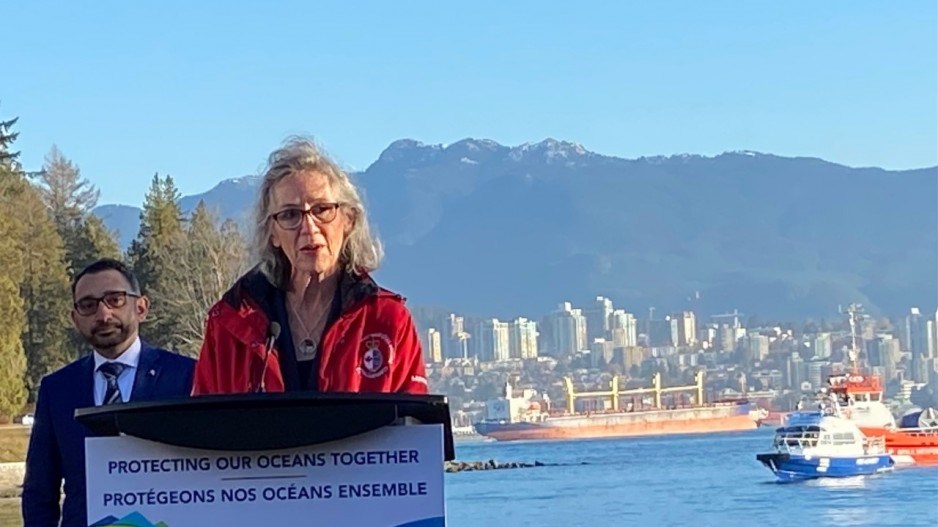Ottawa has committed another $1.2 billion to the Oceans Protection Plan, much of which is focused on enhancing protection of B.C. coastal waters, including better marine oil and fuel spill prevention and response.
Federal cabinet ministers were in Vancouver today to announce “phase 2” of the Oceans Protection Plan.
The $1.2 billion announced today brings the total federal commitments to the plan to $3.5 billion. The plan was initially announced in 2016 with a commitment of $1.5 billion.
The new funding covers 29 new and existing initiatives, including $890 million for 10 initiatives aimed at strengthening marine safety and spill prevention, and $337 million for initiatives involving coastal communities and First Nations.
“This investment will help us develop a more robust pollution response system to keep our waters clean,” said federal Transport Minister Omar Alghabra.
When first launched in 2016, the plan was at least in part a response to the planned expansion of the Trans Mountain pipeline, which raised concerns about increased risks of an oil spill. Increased protection of whales on both the Pacific and Atlantic coasts was also a significant part of the plan.
"Through it, we've put in place measures to address abandoned vessels, protect coastal ecosystems and endangered whale species on both sides of this country, ensure that polluters pay the price for spills, increased accessed to maritime training for under represented groups, (and) advance reconciliation through engagement with indigenous communities," said Natural Resources Minister Jonathan Wilkinson.
The same year the Oceans Protection Plan was announced, there was a tugboat accident near Bella Bella that spilled 110,000 litres of diesel, contaminating shellfish harvest areas of the Heiltsuk First Nation. The spill prompted the Heiltsuk to work with the federal government to enhance its own capacity to deal with spills and marine search and rescue.
“That unfortunate and slow response to the spill convinced our nation that we needed to engage with senior governments to improve the situation,” Heiltsuk Chief Marilyn Slett said at Monday’s announcement. “There’s been a lot of work and a lot of discussion and collaboration since the spill that brought us to this day.”
One of the initiatives funded under the plan was the creation of the Coastal Nations Coast Guard Auxiliary involving the Heiltsuk, Ahousaht and other coastal First Nations.
“This all-volunteer organization comprises First Nations members who augment marine search and rescue capacity in coastal waters,” said Fisheries and Oceans Minister Joyce Murray. “First Nations know these waters better than anyone, and this partnership has saved lives in British Columbia.”
The plan under previous funding has provided vessels for search and rescue to 42 coastal First Nations. Alghabra said the funding includes training for 750 students to help them find jobs in the marine industry. There is also funding for scientific research for dealing with oil spills.
Although it was not mentioned at Monday's announcement, the private sector has also provided funding to enhance oil spill prevention and recovery.
The Western Canada Marine Response Corporation (WCMRC) is a coalition of shippers and oil companies that provide the funding to maintain bases and a fleet of oil spill recovery vessels.
Since the expansion of the Trans Mountain pipeline was approved, the WCMRC has committed additional funding of $163 million to establish six new bases on the coast, increase its fleet of vessels from 44 to 88 and nearly double its operators from 110 to 210.
In the event of an oil spill, the Marine Liability Act obliges the shipper responsible to pay 100% of the cost of damages and remediation. Ship owners are liable up to $162 million. Should the cost of the spill exceed that amount, there is also funding under International Oil Pollution Compensation Fund. Between ship owner liabilities and the IOPCA, a total of $1.37 billion is available for compensation and remediation of major oil spills.
In addition to funding marine search and rescue and marine oil prevention and response, the Oceans Protection Plan has also funded 25 marine habitat rehabilitation projects designed to enhance habitat for Chinook salmon, a major food source for killer whales.




